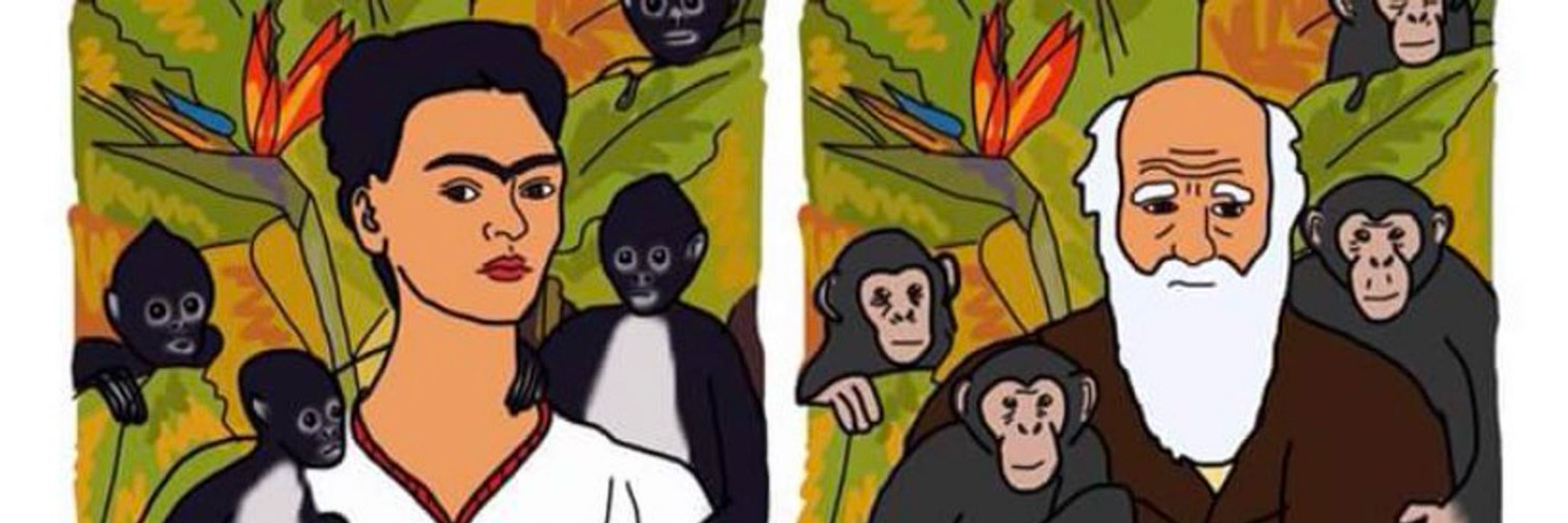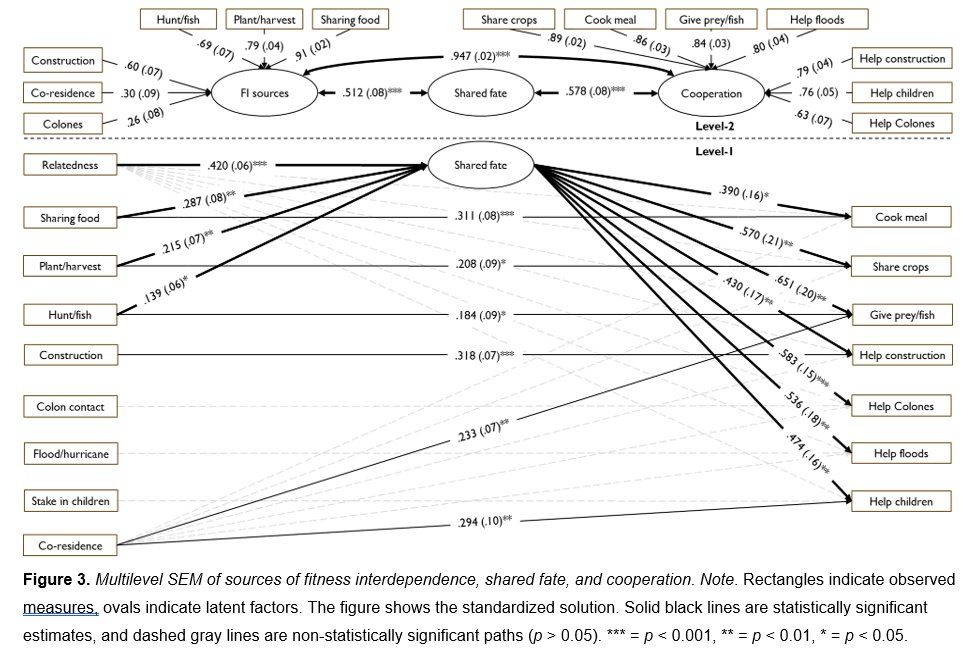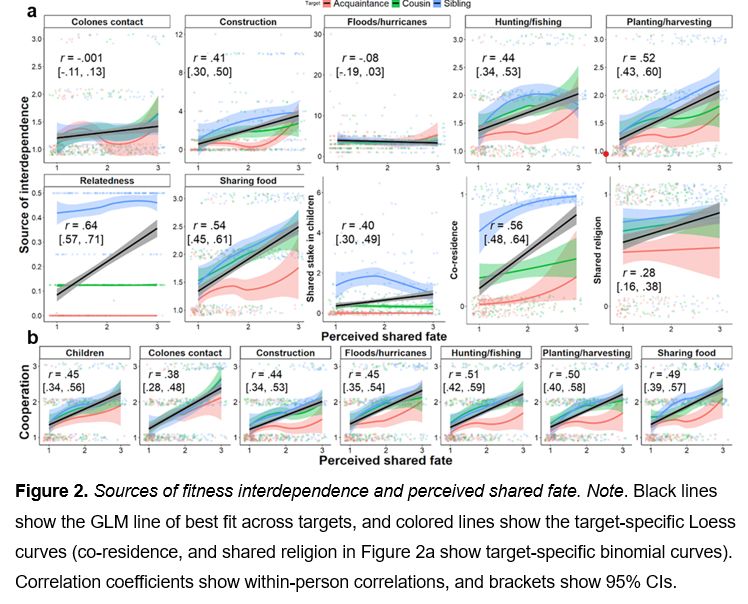
Diego Guevara Beltran
@psycheddiego.bsky.social
Social psych + evo anthropology: Cooperation, interdependence, emotion. Assistant Professor, Department of Psychology, University of Arizona.
http://psycheddiego.mystrikingly.com/
http://psycheddiego.mystrikingly.com/
Could be, I don’t know, it’s an interesting hypothesis, but that kind of conflates zero-sum thinking with other-regarding motivations— one doesn’t logically follow from the other
August 16, 2025 at 3:40 AM
Could be, I don’t know, it’s an interesting hypothesis, but that kind of conflates zero-sum thinking with other-regarding motivations— one doesn’t logically follow from the other
That’s a quantitative issue. Zero-sum thinking likely isn’t binary, it likely exists on a continuum and we’re more likely to see it when it fits our interests, and undermine it when it doesn’t
August 16, 2025 at 1:39 AM
That’s a quantitative issue. Zero-sum thinking likely isn’t binary, it likely exists on a continuum and we’re more likely to see it when it fits our interests, and undermine it when it doesn’t
A preprint of this work can be found here: osf.io/preprints/ps... (10/10).
OSF
osf.io
July 15, 2025 at 4:42 PM
A preprint of this work can be found here: osf.io/preprints/ps... (10/10).
In follow-up work, we will examine sources of interdependence, shared fate, and cooperation (1) among dyads to study bidirectional (i.e., partner) effects, (2) whether shared fate guides partner-choice decisions, and (3) consequences for social integration & wellbeing (9/10).
July 15, 2025 at 4:42 PM
In follow-up work, we will examine sources of interdependence, shared fate, and cooperation (1) among dyads to study bidirectional (i.e., partner) effects, (2) whether shared fate guides partner-choice decisions, and (3) consequences for social integration & wellbeing (9/10).
Combined, results support the hypothesis that shared fate provides a proximate solution to partner choice dilemmas: Help partners to the extent that one has a positive stake in their welfare (8/10).
July 15, 2025 at 4:42 PM
Combined, results support the hypothesis that shared fate provides a proximate solution to partner choice dilemmas: Help partners to the extent that one has a positive stake in their welfare (8/10).
Finally, we show in a follow-up study with a subset of participants (N = 36, Obs. = 108) that shared fate is associated with helping more often in the past two weeks, and actual helping behavior (i.e., forgoing money to purchase a pound of rice for targets) (7/10).

July 15, 2025 at 4:42 PM
Finally, we show in a follow-up study with a subset of participants (N = 36, Obs. = 108) that shared fate is associated with helping more often in the past two weeks, and actual helping behavior (i.e., forgoing money to purchase a pound of rice for targets) (7/10).
We also find that shared fate statistically mediated all associations between relatedness and helping, suggesting shared fate is a key mechanism by which relatedness structures cooperation in this community (6/10).
July 15, 2025 at 4:42 PM
We also find that shared fate statistically mediated all associations between relatedness and helping, suggesting shared fate is a key mechanism by which relatedness structures cooperation in this community (6/10).
However, at the within-person level, relatedness, sharing food (i.e., eating together), and shared subsistence activities (i.e., planting/harvesting, hunting/fishing) emerged as the most diagnostic cues of positive shared fate, and shared fate was associated with helping (5/10).

July 15, 2025 at 4:42 PM
However, at the within-person level, relatedness, sharing food (i.e., eating together), and shared subsistence activities (i.e., planting/harvesting, hunting/fishing) emerged as the most diagnostic cues of positive shared fate, and shared fate was associated with helping (5/10).
In bivariate correlations, we find that 8/10 sources of interdependence were correlated with higher shared fate, and shared fate correlated with more helping across 7 fitness-relevant domains (e.g., helping target's children, sharing crops) (4/10).

July 15, 2025 at 4:42 PM
In bivariate correlations, we find that 8/10 sources of interdependence were correlated with higher shared fate, and shared fate correlated with more helping across 7 fitness-relevant domains (e.g., helping target's children, sharing crops) (4/10).
We wanted to test the idea that shared fate (e.g., "what is good for [target] is good for me") is a summary estimate of the degree to which people share a positive stake with others, and shared fate proximally guides helping towards positively interdependent partners (3/10).
July 15, 2025 at 4:42 PM
We wanted to test the idea that shared fate (e.g., "what is good for [target] is good for me") is a summary estimate of the degree to which people share a positive stake with others, and shared fate proximally guides helping towards positively interdependent partners (3/10).
We interviewed people (N = 146, Obs. = 437) about their sources of interdependence (e.g., relatedness, shared subsistence activities, commensality, co-residence, co-religiosity), shared fate, and helping towards an acquaintance, cousin, and a sibling (2/10).
July 15, 2025 at 4:42 PM
We interviewed people (N = 146, Obs. = 437) about their sources of interdependence (e.g., relatedness, shared subsistence activities, commensality, co-residence, co-religiosity), shared fate, and helping towards an acquaintance, cousin, and a sibling (2/10).

